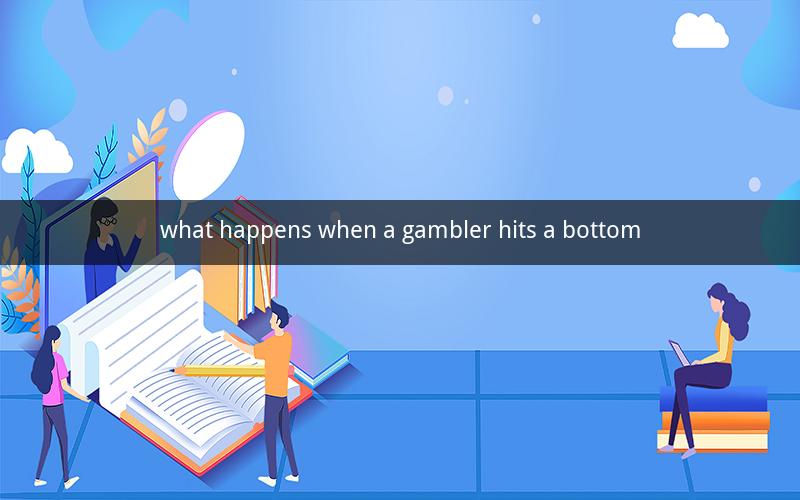
Table of Contents
1. Introduction to Problem Gambling
2. Understanding the Concept of 'Hitting Bottom'
3. Signs and Symptoms of Problem Gambling
4. The Emotional and Psychological Impact of Hitting Bottom
5. The Process of Recovery for a Gambler
6. Support Systems and Resources for Problem Gamblers
7. The Importance of Seeking Professional Help
8. Long-Term Consequences of Hitting Bottom
9. The Role of Family and Friends in Recovery
10. Conclusion
1. Introduction to Problem Gambling
Problem gambling, also known as gambling disorder, is a serious condition characterized by an inability to control or stop gambling despite negative consequences. It affects individuals from all walks of life and can lead to a range of emotional, psychological, and financial problems.
2. Understanding the Concept of 'Hitting Bottom'
Hitting bottom refers to the point at which a problem gambler acknowledges that their gambling behavior is out of control and that they need help. This moment is often marked by a crisis, such as losing a significant amount of money, experiencing legal issues, or facing health problems.
3. Signs and Symptoms of Problem Gambling
Common signs and symptoms of problem gambling include:
- Preoccupation with gambling, spending a lot of time thinking about it
- Needing to bet more money to achieve the desired thrill
- Feelings of guilt, remorse, or shame after gambling
- Failed attempts to stop or control gambling
- Lying to family, friends, or therapists about gambling activities
- Borrowing money to finance gambling habits
- Neglecting personal, family, or work responsibilities due to gambling
4. The Emotional and Psychological Impact of Hitting Bottom
Hitting bottom can be a deeply emotional and psychological experience. A problem gambler may feel overwhelmed by guilt, shame, and fear. They may also experience anxiety, depression, and other mental health issues. The emotional and psychological impact of hitting bottom can be severe and may require professional intervention to overcome.
5. The Process of Recovery for a Gambler
The process of recovery for a problem gambler is often complex and may require time. It typically involves the following stages:
- Acknowledging the problem and accepting responsibility
- Seeking support from family, friends, or support groups
- Developing a plan to stop gambling and manage finances
- Learning coping skills to deal with triggers and cravings
- Rebuilding relationships and restoring trust
- Seeking professional help, if necessary
6. Support Systems and Resources for Problem Gamblers
There are various support systems and resources available for problem gamblers, including:
- Gamblers Anonymous: A 12-step program for individuals struggling with gambling addiction
- Gam-Anon: A support group for family and friends of problem gamblers
- National Council on Problem Gambling: A resource for finding treatment and support services
- Therapists specializing in gambling addiction
- Online support communities and forums
7. The Importance of Seeking Professional Help
Seeking professional help is crucial for a problem gambler's recovery. A therapist or counselor can provide personalized support, coping strategies, and treatment options. Professional help can also address underlying mental health issues that may contribute to gambling addiction.
8. Long-Term Consequences of Hitting Bottom
The long-term consequences of hitting bottom can be significant. A problem gambler may experience financial difficulties, strained relationships, and a damaged reputation. Additionally, they may struggle with mental health issues and substance abuse. Overcoming these consequences requires a comprehensive approach to recovery.
9. The Role of Family and Friends in Recovery
Family and friends play a vital role in a problem gambler's recovery. They can provide emotional support, encouragement, and practical assistance. Encouraging the gambler to seek professional help and attending support groups with them can be beneficial. However, it's important to remember that the responsibility for recovery lies with the gambler themselves.
10. Conclusion
Hitting bottom is a critical moment for a problem gambler, marking the end of their struggle and the beginning of their recovery journey. Understanding the signs and symptoms of problem gambling, seeking professional help, and building a strong support system are essential for overcoming addiction. With determination and support, a problem gambler can overcome their struggles and rebuild their life.
Questions and Answers:
1. What are the primary signs of problem gambling?
Answer: Preoccupation with gambling, increased betting, lying about gambling, neglecting responsibilities, and borrowing money.
2. How can hitting bottom affect a person's mental health?
Answer: Hitting bottom can lead to feelings of guilt, shame, anxiety, depression, and other mental health issues.
3. What is the role of Gamblers Anonymous in recovery?
Answer: Gamblers Anonymous provides a 12-step program for individuals struggling with gambling addiction, offering support and guidance.
4. Can family and friends force a problem gambler to seek help?
Answer: While family and friends can encourage a problem gambler to seek help, they cannot force them. The decision to seek help must come from the gambler themselves.
5. How can a problem gambler rebuild trust with loved ones?
Answer: Rebuilding trust involves being honest, taking responsibility for actions, and making amends for past behavior.
6. Are there any medications that can help treat gambling addiction?
Answer: Some medications, such as naltrexone, may help reduce cravings and impulsive behavior in certain individuals.
7. How long does it take to recover from gambling addiction?
Answer: Recovery from gambling addiction is a lifelong process, with varying timelines for different individuals.
8. Can a problem gambler recover without seeking professional help?
Answer: While some individuals may recover without professional help, seeking support from therapists or counselors can enhance the recovery process.
9. What can friends and family do to support a recovering problem gambler?
Answer: Friends and family can offer emotional support, encourage attendance at support groups, and help the gambler establish healthy boundaries.
10. Is it possible for a problem gambler to relapse after recovery?
Answer: Yes, relapse is possible, even after recovery. However, with proper support and coping strategies, a problem gambler can overcome relapse and continue their recovery journey.